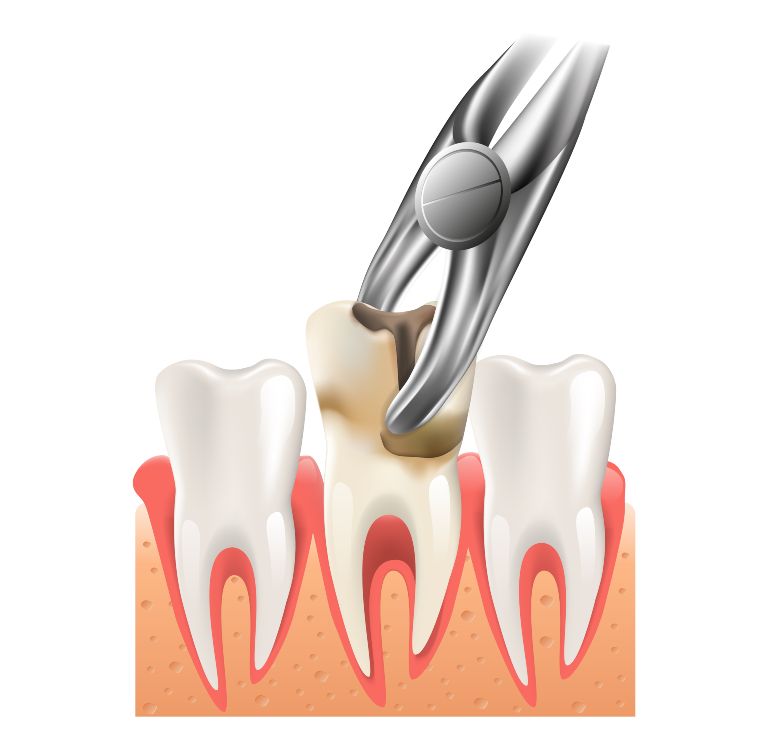Did you know that teeth are actually living things? That’s right, this means it’s also possible for teeth to die. Tooth death most often happens due to physical trauma, such as s deep cavity or cracked tooth. Dead teeth can be reclaimed through the use of root canal therapy, but to fully understand how this works it’s important to first know the anatomy of a tooth.
The end of the tooth that you can see in an open mouth is called the crown, while the base of the teeth that lies buried in gums and bone is called the root. Each tooth has three basic layers. The outer layer is called the enamel, and the inner layer around the root is called cementum. Inside these layers you find the last layer, the dentin. Underneath the dentin lies the pulp, which is made up of nerves, blood vessels and other tissue. People often refer to the pulp as the “nerve.” This is not technically accurate, since nerves and blood vessels are only partially in the tooth and partially in the bones and gums through the roots.
The pulp can get harmed if the layers of the teeth get cracked or rot away, and this can lead to infection caused by liquid pressure, gasses, pus, or invading germs. This will result in swelling and a good deal of pain, signaling the death of your tooth.
Teeth that are referred to as “dead” are called so because there is no more blood flowing to it, hence it cannot sustain life. You’ve got various terms for dead teeth, including “non-vital tooth,” or “necrotic pulp.”
Once a tooth dies, it’s only a matter of time before it falls out of its own accord. It is not a wise decision to allow this to happen, however, as it can harm your other teeth and jaw and can actually be pretty dangerous. Depending on the type and extent of the damage, it may be days, weeks, months, and sometimes even years before the tooth falls out. This doesn’t mean you should wait around for it to happen, and it’s strongly recommended you go to your dentist and get the tooth dealt with as soon as possible after noticing the death of your tooth.
It’s generally not possible to tell if a tooth is dead by simply looking at it, and it’s always better to get a dentist to give you a proper diagnosis instead trying to guess or figure it out yourself. Yet another reason to go for regular dentist check-ups.
Two sure signs that you should go and get your teeth looked at by a dental professional include discomfort or pain, and if your teeth are changing in color or getting darker.
Pain will often mean that the pulp is infected or the tooth nerve is dying. Many people think that once the nerve is dead you won’t feel anything. This is not the case, as the pain doesn’t come from inside the tooth, but from nerve endings on the tooth’s exterior. These are referred to as the periodontal membrane.

Once a tooth is damaged or decaying, it’s only a matter of time before it dies. Depending on how heavy the damage, the tooth could die within a matter of days or even a couple of months. Darkened or discolored teeth are often the first sign that your tooth is on its way out. Teeth that are healthy should be a shade of white. Depending on how you upkeep your teeth on a daily basis, your teeth will be whiter or more yellowish. Coffee, red wine, smoke and blueberries are just a few of the things that could darken your teeth. When consumed on a daily basis, these could all have adverse effects on your teeth (although blueberries are by far the most harmless of the lot).
If you have a tooth that’s dying, it will appear different than the other teeth, shifting more towards yellow, gray, light brown, and, in some cases, black.
Once you experience any of these symptoms, instead of waiting for your tooth to die or fall out, you should definitely visit a dentist and deal with it before it gets too serious or does any heavier damage. A dead or dying tooth left in the mouth may not do a whole lot of immediate damage right off the bat, but leaving it in for too long can cause other teeth to rot and even cause problems and unwanted issues with your jaw.

As we’ve covered above, leaving a tooth in your head once it’s already dead or dying can cause further complications if the infection spreads. But that’s not all. Some more immediate results include a marred appearance and foul breath. When a tooth is dead, it’s generally very visible, and if it’s one of the teeth in the forefront of your smile it can be very distracting and unpleasant to look at, especially if it’s a black tooth. And nobody appreciates speaking to someone whose breath smells bad.
Once the nerves fizzle out and die, you might have to get root canal therapy. It’s a painless procedure that consists of a couple simple steps. First, you will receive a local anesthetic to numb the area of your mouth that will be operated on. Next, an opening is created so your dentist can access the area with the pulp. The pulp is then removed and the canals get cleaned out to prepare the space for the filling, after which the filling is placed and the process is done.
Keeping a healthy lifestyle, eating healthy, and maintaining good oral health by brushing and flossing daily can help you avoid any dead teeth altogether. Couple that with regular dentist visits and you can honestly say you’re doing your best to safeguard your oral health.

